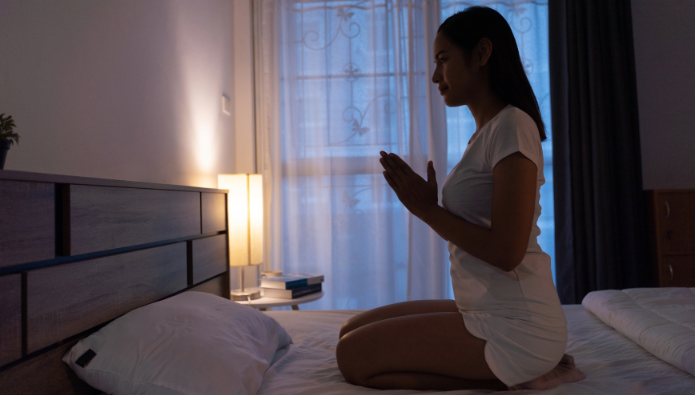In today’s fast-paced world, many of us struggle with getting a good night’s sleep. Stress, anxiety, and the demands of daily life can leave our minds racing when we finally lay down to rest. The lack of quality sleep impacts not only our physical health but also our mental and emotional well-being. It’s no wonder that so many people are searching for effective ways to improve their sleep.
One powerful and often overlooked solution is incorporating a prayer for good sleep into your nightly routine. Prayer can have a profoundly calming and soothing effect, helping to quiet the mind and ease the heart. By turning to prayer, you can invite a sense of peace and tranquility, which is essential for falling asleep and staying asleep through the night.
The focus of this blog post is to explore how a prayer for good sleep can enhance your sleep quality and reduce anxiety. We will provide you with a beautifully crafted prayer to recite before bedtime, explain the elements of this prayer, and offer additional prayers tailored to various sleep-related situations. Moreover, we will guide you on personalizing your prayer to make it more meaningful and discuss how to cope with unanswered prayers.
By incorporating a prayer for good sleep into your daily routine, you can create a serene bedtime ritual that promotes restful sleep and alleviates the anxiety that often accompanies sleepless nights. Join us as we delve into the transformative power of prayer and discover how it can lead to more peaceful and restorative nights.
Related: Prayers for Different Situations
A Prayer for Good Sleep

Heavenly Father,
As I prepare to rest, I come before You with a heart full of gratitude for the day that has passed. Thank You for Your constant presence and the many blessings You have bestowed upon me.
Lord, I ask for Your peace to envelop me tonight. Calm my mind and soothe my spirit. Let me release the worries and stresses of the day into Your loving hands. Help me to trust in Your care and provision, knowing that You watch over me always.
Grant me a restful and restorative sleep. Protect me from any anxieties or fears that might disrupt my slumber. Surround me with Your angels, guarding me through the night and keeping me safe.
As I sleep, renew my strength and rejuvenate my body. Let my dreams be peaceful and filled with Your presence. Prepare me for the day ahead, refreshed and ready to serve You with a joyful heart.
Thank You, Lord, for Your endless love and faithfulness. I place my trust in You, confident that You will grant me the gift of good sleep.
In Jesus’ name, I pray.
Amen.
Take a Moment for Reflection
We invite you to take a few moments to pray and reflect on these words before bedtime. Allow the peace of God to fill your heart and mind, letting go of the day’s worries. Trust in His protection and care as you rest, and embrace the tranquility that comes from His presence. May this prayer for good sleep bring you the comfort and serenity you need for a peaceful night.
Explanation of the Prayer for Good Sleep

Opening with Gratitude
The prayer for good sleep begins with a heart full of gratitude, thanking God for His constant presence and the blessings of the day. This opening sets a positive tone, helping to shift focus away from worries and onto the good things that have occurred. Gratitude is a powerful emotion that can reduce stress and promote a sense of well-being, making it easier to transition into a restful state.
Requesting Peace and Calm
Next, the prayer for good sleep asks for God’s peace to envelop us. This request is significant as it directly addresses the common causes of sleeplessness: a restless mind and anxious spirit. By inviting God’s peace, we are asking for a divine intervention to calm our thoughts and soothe our emotions, creating a conducive environment for sleep.
Releasing Worries and Trusting in God
A crucial part of the prayer is the act of releasing the day’s worries into God’s loving hands. This is an act of faith and trust, acknowledging that we are not in control and that it is okay to let go. This surrender can significantly reduce anxiety, as it shifts the burden from our shoulders to God’s, providing a deep sense of relief and comfort.
Asking for Restful and Protective Sleep
The prayer for good sleep continues with a request for restful and restorative sleep, free from anxieties and fears. This part emphasizes the need for protection during the night, asking for God’s angels to guard us. This protective aspect can alleviate subconscious fears and create a sense of security, which is essential for uninterrupted sleep.
Seeking Renewal and Rejuvenation
The prayer also asks for physical and mental renewal during sleep. By requesting that our strength be renewed and our bodies rejuvenated, we are focusing on the restorative power of sleep, which is vital for our overall health and well-being. This part reinforces the idea that sleep is not just a physical need but a divine gift that prepares us for the challenges of the next day.
Closing with Trust and Gratitude
Finally, the prayer for good sleep concludes by expressing trust in God’s love and faithfulness, reiterating our confidence in His ability to grant us good sleep. This closing affirmation reinforces our faith and leaves us with a peaceful heart, ready to embrace rest.
The Calming Effects of Focusing on God's Presence
Alleviating Stress
One of the primary benefits of the prayer for good sleep is its ability to alleviate stress. By focusing on God’s presence, we shift our attention from our problems to His power and love. This shift in focus can reduce the production of stress hormones, such as cortisol, and promote relaxation.
Fostering a Sense of Peace
Inviting God’s peace into our hearts fosters a profound sense of tranquility. The act of prayer itself can be meditative, slowing down our breathing and heart rate, which are physiological responses associated with relaxation. This sense of peace is crucial for falling asleep and staying asleep throughout the night.
Building Trust and Security
The prayer for good sleep encourages us to trust in God’s protection and provision. This trust can alleviate underlying fears and anxieties that might otherwise disrupt our sleep. Feeling secure in God’s care allows us to relax fully and enter a state of deep, restful sleep.
Enhancing Gratitude and Positivity
Gratitude is a key element of the prayer for good sleep, and it plays a significant role in fostering a positive mindset. By focusing on the blessings of the day, we end our day on a positive note, which can enhance our mood and contribute to better sleep quality.
In summary, the prayer for good sleep is a holistic approach to addressing sleep issues and anxiety. By breaking down each part of the prayer and understanding its significance, we can appreciate how this practice promotes good sleep and reduces anxiety. Focusing on God’s presence, expressing gratitude, and releasing our worries into His hands can create a peaceful and restful environment, allowing us to experience the restorative power of sleep.
Related: A Prayer for Strength and Healing
5 Different Prayers for Good Sleep in Various Situations

1. A Prayer for Good Sleep: Anxiety Relief
Heavenly Father,
As I prepare for sleep, I come to You with a heart burdened by anxiety and fear. I ask for Your peace to wash over me, calming my mind and soothing my spirit. Help me to release these anxious thoughts into Your capable hands, trusting in Your care and protection. Let Your comforting presence surround me, and grant me a night of restful sleep free from worry.
In Jesus’ name, I pray.
Related: A Prayer for Anxiety Relief
2. A Prayer for Good Sleep: Physical Discomfort
Loving God,
Tonight, I seek Your healing touch. I ask for relief from the physical discomfort and pain that hinder my sleep. Please ease my body and bring comfort to my aching muscles and joints. As I rest, may Your healing power renew my strength and rejuvenate my body. Grant me a night of uninterrupted, restorative sleep, and awaken me refreshed and ready for the day ahead.
In Your healing name, I pray.
Amen.
3. A Prayer for Good Sleep: Protection and Safety
Dear Lord,
As darkness falls, I seek Your protection over myself and my loved ones. Surround us with Your angels and keep us safe from harm. Let Your presence be a shield around us, guarding us through the night. Calm any fears and grant us the peace that comes from knowing You are always watching over us. Bless us with a restful and secure sleep under Your divine protection.
In Jesus’ name, I pray.
Amen.
Related: A Prayer for Protection
4. A Prayer for Good Sleep: Peaceful Mind
Gracious God,
I come before You with a mind full of thoughts and worries. Help me to quiet my mind and let go of the day’s stressors. Fill my heart with Your peace and my mind with Your calm. As I lay down to sleep, may I find rest in Your loving embrace. Clear my thoughts and bring me the tranquility I need to sleep peacefully and wake up refreshed.
In Your peaceful name, I pray.
Amen.
5. A Prayer for Good Sleep: Gratitude and Reflection
Almighty Father,
As I prepare for sleep, I reflect on the blessings of this day. Thank You for Your countless gifts and for Your presence in my life. Help me to end this day with a heart full of gratitude. Let me dwell on the positives and count my blessings, no matter how small. Grant me a restful night as I lay down in thankfulness, knowing that Your love surrounds me.
In Jesus’ name, I pray.
Amen.
These different prayers for good sleep address specific situations that can disrupt rest. By praying for anxiety relief, physical comfort, protection, a peaceful mind, and gratitude, we can invite God’s presence into our lives and find the peace and rest we need.
Personalizing Your Prayer for Good Sleep

Encourage Individual Connection
To make your prayer for good sleep more impactful, it’s essential to personalize it to fit your specific needs and concerns. While standard prayers provide a helpful framework, adding your own words and intentions can deepen your connection with God and make the prayer more meaningful. Consider what particular issues are affecting your sleep.
Are you dealing with stress, anxiety, physical discomfort, or worries about the future? Address these directly in your prayer. By tailoring your prayer for good sleep to your unique circumstances, you invite God’s presence into the specific areas of your life where you need His comfort and peace the most.
Use Personal Experiences
Incorporating personal reflections and details into your prayer for good sleep can make it more relevant and heartfelt. Think about the events of your day, the challenges you faced, and the moments of joy and gratitude. Reflect on how these experiences impacted your state of mind as you prepare for sleep.
For example, if you had a particularly stressful day at work, mention this in your prayer and ask for God’s peace to calm your mind. If you experienced a moment of kindness or received good news, express your gratitude to God for these blessings. By including these personal touches, you create a more intimate and authentic dialogue with God.
Example:
Standard Prayer:
“Dear Lord,
Help me to release the worries of the day and find peace in Your presence.
Amen”
Personalized Prayer:
“Dear Lord,
today was overwhelming with the project deadline at work, and I still feel the stress lingering. Please help me to release this burden into Your hands and find peace in Your presence tonight. Thank You for the encouraging words from my colleague that reminded me of Your grace.
In Jesus name, I pray,
Amen.”
Regular Practice
Making your prayer for good sleep a nightly ritual can significantly enhance its effectiveness. Consistency in prayer not only helps to establish a routine but also reinforces your connection with God, making it easier to find peace and rest.
Set aside a specific time each night to pray, whether it’s right before you go to bed or after your evening activities have concluded. Create a peaceful environment conducive to prayer, such as dimming the lights, playing soft music, or lighting a candle.
Tips for Regular Practice:
- Set a Reminder: Use a phone alarm or a reminder note to ensure you remember to pray each night.
- Keep a Journal: Write down your prayers and any reflections on how they impact your sleep and overall well-being.
- Create a Prayer Space: Designate a quiet, comfortable spot for your nightly prayer routine to help you focus and feel more connected to God.
By integrating your prayer for good sleep into your nightly routine, you create a habit of turning to God for peace and comfort, making it easier to let go of the day’s worries and rest in His presence. This regular practice can transform your sleep experience, helping you wake up refreshed and ready to face each new day with a sense of calm and gratitude.
Personalizing your prayer for good sleep allows you to address your unique needs and experiences, fostering a deeper connection with God. By making this prayer a regular part of your nightly routine, you invite God’s peace into your life consistently, enhancing your ability to rest and reducing anxiety.
What You Can Do Yourself to Get a Good Night's Sleep

While incorporating a prayer for good sleep into your nightly routine is a powerful step towards achieving restful sleep, there are also practical actions you can take to enhance the quality of your sleep. Combining spiritual practices with healthy habits can create a holistic approach to better rest.
Establish a Consistent Sleep Schedule
Consistency is key when it comes to sleep. Try to go to bed and wake up at the same time every day, even on weekends. This helps regulate your body’s internal clock, making it easier to fall asleep and wake up naturally. A consistent schedule reinforces your body’s sleep-wake cycle, leading to improved sleep quality.
Create a Relaxing Bedtime Routine
Developing a calming pre-sleep routine can signal to your body that it’s time to wind down. Activities such as reading a book, taking a warm bath, or listening to soothing music can help transition your mind and body into sleep mode. Including a prayer for good sleep in this routine can further enhance its calming effects.
Optimize Your Sleep Environment
Ensure that your bedroom is conducive to sleep. This means keeping it cool, dark, and quiet. Consider using blackout curtains to block out light and a white noise machine to drown out disruptive sounds. A comfortable mattress and pillows are also essential for a good night’s sleep. Removing electronic devices that emit blue light can prevent sleep disruption, allowing you to fall asleep more easily after your prayer for good sleep.
Limit Exposure to Stimulants
Caffeine and nicotine are stimulants that can interfere with your ability to fall asleep. Try to avoid consuming these substances in the hours leading up to bedtime. Instead, opt for calming beverages like herbal tea, which can help relax your body and mind as you prepare for your prayer for good sleep.
Manage Stress and Anxiety
Stress and anxiety are common culprits behind sleepless nights. Incorporating relaxation techniques such as deep breathing exercises, meditation, and mindfulness can help manage these feelings. Practicing gratitude and reflecting on the positive aspects of your day can also alleviate stress. This can be seamlessly integrated with your nightly prayer for good sleep, helping you release worries and find peace.
Exercise Regularly
Regular physical activity can significantly improve sleep quality. Aim for at least 30 minutes of moderate exercise most days of the week. However, avoid vigorous exercise close to bedtime, as it can have a stimulating effect. Finding a balance that suits your schedule and preferences can enhance the benefits of your prayer for good sleep.
Watch Your Diet
What you eat and drink can impact your sleep. Avoid large meals, spicy foods, and heavy snacks before bedtime, as these can cause discomfort and disrupt sleep. Instead, opt for light, sleep-friendly snacks such as a small serving of nuts or a piece of fruit. Hydrating well during the day but limiting fluids before bed can prevent nighttime awakenings.
Limit Naps
While naps can be beneficial, especially if you’re sleep-deprived, they can also interfere with nighttime sleep if taken too late in the day. If you need to nap, try to do so earlier in the afternoon and keep it short, around 20-30 minutes.
Incorporate Natural Light
Exposure to natural light during the day helps regulate your sleep-wake cycle. Try to spend time outside during daylight hours, especially in the morning. This can improve your ability to fall asleep at night, making your prayer for good sleep more effective.
In conclusion, while a prayer for good sleep is a crucial component of achieving restful sleep, combining it with these practical strategies can create a comprehensive approach to improving your sleep quality. By establishing a consistent sleep schedule, creating a relaxing bedtime routine, optimizing your sleep environment, managing stress, and maintaining healthy lifestyle habits, you can enhance the effectiveness of your prayer for good sleep and enjoy more peaceful, restorative nights.
How to Deal with Unanswered Prayers

Understanding God’s Timing
One of the most challenging aspects of maintaining a prayer for good sleep is dealing with the reality that not all prayers are answered immediately or in the way we expect. It’s important to remember that God’s timing is perfect, even when it doesn’t align with our own desires. The Bible reminds us in Isaiah 55:8-9 that God’s ways are higher than our ways, and His thoughts are higher than our thoughts. This means that sometimes, the answer to our prayers might be delayed or come in a form we didn’t anticipate.
When your prayer for good sleep seems unanswered, it doesn’t mean that God hasn’t heard you. It could be that He is working in ways that are not immediately visible or that there is a greater purpose behind the delay. Trusting in God’s perfect timing requires patience and faith, acknowledging that His plans for us are ultimately for our good, even if we cannot see it in the moment.
Maintaining Faith
Maintaining faith during times of unanswered prayers is crucial. It can be discouraging when we pray earnestly and don’t see immediate results. However, persistent prayer and unwavering faith are essential components of a strong spiritual life. Jesus teaches us the importance of persistent prayer in Luke 18:1-8 through the parable of the persistent widow. This story encourages us to keep praying and not give up, trusting that God is faithful.
Continuing to offer a prayer for good sleep, even when answers are not apparent, strengthens our relationship with God and builds spiritual resilience. It helps us develop a deeper reliance on Him, knowing that He is our source of comfort and strength. Faith is not just about receiving immediate answers but about trusting in God’s unfailing love and wisdom.
Seeking Additional Help
While prayer is a powerful tool for finding peace and rest, it’s also important to consider other methods that can complement your prayer for good sleep. God has provided us with various resources and means to address our needs, and sometimes, seeking additional help can be part of His plan for your healing and well-being.
Medical Advice: If sleep issues persist, consulting a healthcare professional can be beneficial. There may be underlying medical conditions or sleep disorders that require attention. Medical professionals can offer treatments or strategies to improve your sleep quality.
Relaxation Techniques: Incorporate relaxation techniques such as deep breathing exercises, meditation, or progressive muscle relaxation into your nightly routine. These methods can help calm your mind and body, making it easier to fall asleep. Combining these practices with your prayer for good sleep can enhance their effectiveness.
Healthy Sleep Habits: Establishing good sleep hygiene is essential. This includes maintaining a regular sleep schedule, creating a comfortable sleep environment, and avoiding stimulants like caffeine before bedtime. These practical steps, along with your nightly prayer for good sleep, can contribute to better sleep quality.
Support from Loved Ones: Sometimes sharing your struggles with friends or family members can provide emotional support and practical advice. They can also pray with you and for you, offering a sense of community and solidarity in your spiritual journey.
In conclusion, dealing with unanswered prayers requires understanding, faith, and sometimes additional help. Trust in God’s perfect timing, maintain your faith through persistent prayer, and consider other supportive methods to improve your sleep. By doing so, you can find peace and rest, knowing that God is with you every step of the way.
Conclusion
Incorporating a prayer for good sleep into your nightly routine can have a profound impact on your overall well-being. By turning to God each night, you invite His peace into your life, which can significantly reduce anxiety and promote restful sleep. Prayer helps to quiet the mind, soothe the spirit, and create a sense of calm that is essential for a good night’s rest. This simple yet powerful practice not only enhances your sleep quality but also strengthens your relationship with God, providing spiritual nourishment and comfort.
As you continue to seek God’s peace through regular prayer, remember the importance of consistency. Making prayer for good sleep a part of your nightly ritual can transform your approach to rest, helping you to release the day’s stresses and embrace the tranquility that comes from God’s presence. Whether you are dealing with anxiety, physical discomfort, or simply seeking a more peaceful mind, turning to prayer can provide the solace and strength you need.
We encourage you to keep faith and persist in your prayers, even when answers are not immediate. Trust in God’s perfect timing and His plan for your life. Complement your prayers with healthy sleep habits and relaxation techniques to further enhance your sleep quality.
Closing Blessing
May the Lord bless you and keep you. May His face shine upon you and be gracious to you. As you lay down to sleep each night, may you feel His comforting presence and experience the peace that surpasses all understanding. May your nights be restful and your sleep be sweet, refreshed and ready for each new day with a heart full of gratitude and faith.
Amen.
Also Read: A Prayer for Good Health








